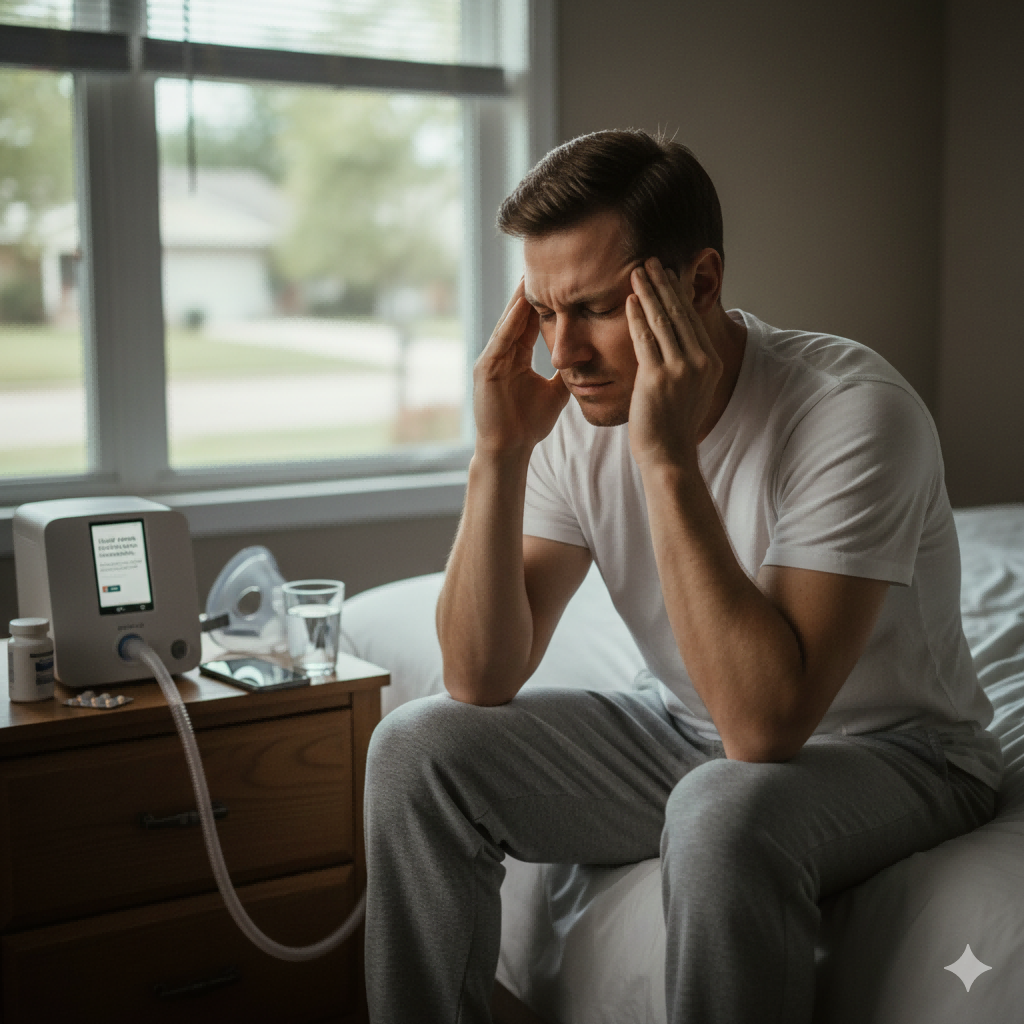Sleep Apnea Headaches: Causes, Symptoms, and Effective Treatments


Waking up with a pounding headache can ruin your entire day. If this happens frequently, it may not just be stress or dehydration—it could be sleep apnea headaches. Millions of people suffer from this condition without realizing that poor sleep and oxygen deprivation are at the root of their pain.
In this article, we’ll explore what sleep apnea headaches are, why they happen, and most importantly, how you can treat and prevent them.
Introduction to Sleep Apnea and Headaches
What is Sleep Apnea?
Sleep apnea is a sleep disorder where your breathing repeatedly stops and starts during the night. The most common type, obstructive sleep apnea (OSA), happens when throat muscles relax and block the airway.
This not only disrupts sleep but also lowers oxygen levels in the blood, leading to multiple health issues—including chronic morning headaches.
How Sleep Apnea Causes Morning Headaches
When oxygen levels drop, your brain reacts by increasing blood flow and pressure. The result? A throbbing headache that greets you as soon as you wake up. These headaches are often described as dull, pressure-like pain around the forehead and temples.
Understanding the Link Between Sleep Apnea and Headaches
Oxygen Deprivation and Brain Pressure
Reduced oxygen and increased carbon dioxide levels trigger blood vessel dilation, causing pressure headaches.
Sleep Fragmentation and Neurological Impact
Interrupted sleep alters neurotransmitters like serotonin and dopamine, making you more prone to migraines and tension headaches.
Role of Blood Flow and Carbon Dioxide Levels
Poor breathing regulation at night increases carbon dioxide, which worsens vascular headaches.
Symptoms of Sleep Apnea Headaches
- Headaches within minutes of waking up
- Pain lasting less than 30 minutes (unlike migraines)
- Pressure-like sensation instead of throbbing pain
- Paired with loud snoring, daytime fatigue, and irritability
👉 Unlike migraines, sleep apnea headaches rarely cause nausea, light sensitivity, or aura.
Risk Factors and Triggers
- Obesity: Excess weight increases airway obstruction.
- Alcohol & Smoking: Both relax throat muscles, worsening apnea.
- Medical Conditions: High blood pressure, diabetes, and nasal congestion increase risk.
Diagnosing Sleep Apnea Headaches
- Sleep Studies (Polysomnography): Gold standard for diagnosis.
- Home Sleep Tests: Convenient and affordable for initial screening.
- Consult a Doctor: If headaches persist despite lifestyle changes.
Effective Treatments for Sleep Apnea Headaches
CPAP Therapy and Alternatives
A CPAP machine keeps airways open, reducing both sleep apnea and morning headaches.
Lifestyle Changes and Home Remedies
- Sleeping on your side
- Avoiding alcohol before bed
- Using nasal strips or humidifiers
Medications and Surgical Options
In severe cases, surgery may be needed to remove airway blockages.
Prevention and Long-Term Management
- Healthy Sleep Habits: Stick to a regular schedule.
- Weight Management & Exercise: Even small weight loss reduces symptoms.
- Stress Reduction: Try yoga, meditation, or breathing exercises.
Living with Sleep Apnea Headaches
- Keep a sleep diary to track symptoms.
- Join support groups for motivation.
- Work closely with a sleep specialist for tailored care.
FAQs on Sleep Apnea Headaches
1. Are sleep apnea headaches dangerous?
Yes, because they indicate reduced oxygen to the brain, which can harm cardiovascular health.
2. Do CPAP machines really stop headaches?
Absolutely—most patients report significant improvement within weeks.
3. Can sleep apnea cause migraines?
It doesn’t directly cause migraines but can trigger them in those already prone.
4. How long do sleep apnea headaches last?
Typically less than 30 minutes after waking up.
5. Can children get sleep apnea headaches?
Yes, especially if they have enlarged tonsils or obesity.
6. What’s the best home remedy?
Sleeping on your side and maintaining a healthy weight often help reduce headaches naturally.
Conclusion
Sleep apnea headaches are more than just a nuisance—they’re a warning sign that your brain isn’t getting enough oxygen during sleep. The good news? With proper diagnosis, treatment, and lifestyle changes, you can wake up refreshed and headache-free.
For more in-depth medical guidance, visit American Academy of Sleep Medicine.
















